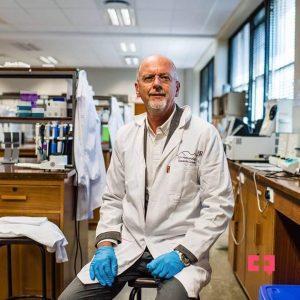 Prof Gerhard Walzl is a clinician scientist trained in the fields of internal medicine, pulmonology and intensive care medicine. His research focuses on the immunology of Mycobacterium tuberculosis (M.tb) infection and in particular host biomarkers, including diagnostic markers, markers of TB treatment response and markers of protective immunity against M.tb. In addition, he has set up a ‘site of TB disease’ research program at Tygerberg Academic Hospital that includes research bronchoscopies, thoracocentesis and pleural biopsies to investigate immune responses in the lung and pleura. His research spans the divide between clinical and basic sciences in a high TB prevalence area.
Prof Gerhard Walzl is a clinician scientist trained in the fields of internal medicine, pulmonology and intensive care medicine. His research focuses on the immunology of Mycobacterium tuberculosis (M.tb) infection and in particular host biomarkers, including diagnostic markers, markers of TB treatment response and markers of protective immunity against M.tb. In addition, he has set up a ‘site of TB disease’ research program at Tygerberg Academic Hospital that includes research bronchoscopies, thoracocentesis and pleural biopsies to investigate immune responses in the lung and pleura. His research spans the divide between clinical and basic sciences in a high TB prevalence area.
He is a distinguished professor in the Department of Biomedical Sciences of the SU Faculty of Medicine and Health Sciences, an entity that he has led since 2017. He also heads the Molecular Biology and Human Genetics Division, is director of the Immunology Research Group (SU-IRG) and leads the NRF Chair for Tuberculosis Biomarkers.
We are proud to have him close out a brilliant year as our December immunologist of the month!
What is your educational background? What have you studied and why did you decide to pursue immunology as your research interest, with a specific focus on Tuberculosis?
After completing my MBChB at the University of Pretoria I did my internship at Tygerberg Hospital before spending 2 years in Austria on a fellowship, where I started to learn the trade of intensivist. After qualifying as internal medicine specialist at Stellenbosch University and at Tygerberg Hospital I underwent training as pulmonology subspecialist before leaving for London to embark on a PhD in immunology. Immunology just seemed very aligned to lung medicine, where infections play a major role and in South Africa the TB problem was at the forefront of our challenges. At Imperial College London I worked on murine models of co-infections with unrelated pathogens. Upon my return to SA in 2002, I started the immunology group (Stellenbosch University Immunology Research Group, IRG), which initially continued to work on murine infection models, including helminth-mycobacterial co-infections but soon started working on TB biomarkers. The group gradually grew to what it is today, with >130 staff, 6 principle investigators, each with their own research focus, including a clinical team that works closely with the PIs within IRG and also outside IRG.
What was it like to work in immunology when you started, especially at SU?
My predecessor was Prof AD Beyers, whose group basically came to a halt with his very early and untimely death just a few years before I joined. So, we had to rebuild immunology research from scratch. It was hard work with limited expertise on campus but luckily there was a strong mycobacterial research enterprise to interact with.
How has your research contributed to a better understanding your research area?
I think that we were some of the trailblazers in the TB host biomarker field and our research helped to align biomarker discovery efforts. We worked in national and international consortia and I think my own impact was mostly as part of great collaborations across the world.
From clinical work through to the laboratory, how has the transition from clinical rotations to the fluorescent lights of the lab been?
The space between clinical and lab-based work is an exciting continuum. It spans from bedside to bench and back to bedside. For me research must have clinical implications, even if that impact is not immediately applicable, but we must strive to contribute our small puzzle pieces to eventual improvement of health care for our populations. I miss being a clinician but also think that I have chosen the best path for myself as being a full-time clinician always threw up questions that can only be resolved with research that includes lab-based approaches and it was frustrating not to be able to pursue those as full-timer.
What attracted you to the Immunology of MtB?
TB is a big killer and the immunology of TB encompasses a really wide spectrum of research- actually the entire field of immunology. There are great models, including murine, clinical and in vitro models, lots of reagents available.
You have traveled a lot during your career. Do you have some preferred places or stories that you want to share?
Most of my friends are collaborators across the world. I love visiting them and some of them have become house friends. We have had a lot of fun together, from conference halls, to ski slopes, to raging rivers, to strenuous hikes. The friendships are one of the greatest positives of this career.
Can you give some advice to early stage immunologists and clinicians?
If you don’t have a passion for science, don’t do it. Go and find your passion. If you do have the passion for science, whether that is immunology or something else, go for it full kilter. There are lots of great moments to be captured, in spite of rejections and setbacks. Just follow your dreams. But you need the passion.
What do you hope to achieve once you decide to hang up the lab coat and scrubs?
To get more grants so that I can stick around for muuuuch longer, if anyone will tolerate my further presence. Science is fun, and I am looking forward to doing much more science and much less admin!
Interview by Stefan Botha










